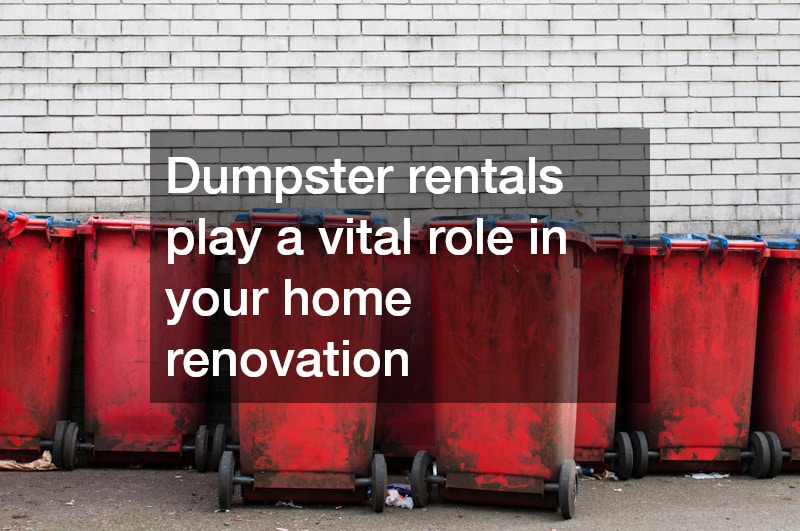Enhancing your home through renovation can be both exciting and challenging. A critical aspect of the process involves managing waste effectively. For example, a 30 yard dumpster rental offers a convenient solution for keeping your project clean and organized, while also saving time and effort. They help streamline the cleanup process, ensuring that debris and materials are disposed of quickly, preventing clutter and potential hazards.
This article will go over the differences in size, how to book a rental, and the appropriate items to place in a dumpster rental.
What Size Dumpster Do I Need for My Home Renovation?
Selecting the right size dumpster is crucial for efficient waste management. Home renovation projects vary significantly in scope, from small bathroom makeovers to complete overhauls, necessitating careful consideration of dumpster sizes. Dumpster rentals typically range from 10 to 40 cubic yards, with each size designed for specific types of projects.
Small dumpsters, often around 10 yards, are perfect for minor renovations where limited waste is generated. These are suitable for small kitchen remodels or bathroom upgrades that produce debris mainly composed of drywall, wood, and tiles. Larger projects like extensive kitchen remodels, landscaping overhauls, or full basement cleanouts may require 20 to 30-yard containers to accommodate the increased volume of waste materials.
For massive renovations like gutting an entire home or large construction projects, 40-yard dumpsters offer ample space. Choosing an appropriately sized dumpster prevents the need for multiple hauls, optimizing both time and costs. Many providers also offer rental flexibility, allowing for adjustments to accommodate evolving project needs, further easing waste management concerns.
How Do I Go About Booking a Dumpster Rental?
Renting a dumpster can seem daunting if you’re unfamiliar with the process. The first step involves selecting a reliable provider with positive reviews and a clear track record of timely service and transparent pricing. It is crucial to compare different providers, investigating their tenure in the business and reading customer feedback for insights into their reliability.
Once a provider is chosen, the next step is to understand their pricing structures and the details of the rental agreement. It is important to be aware of what is included in the pricing package, such as delivery, pickup, weight limits, and any additional fees for overages or extended rental periods. Some companies may offer discounted rates for longer rental durations or during off-peak seasons, providing opportunities for cost savings.
After understanding the terms, arranging for delivery and pickup based on your project timeline ensures seamless integration into the renovation process. Clearly communicating the delivery logistics, such as space requirements for the dumpster, can minimize disruptions and guarantee efficient waste management. Many providers offer online tools for scheduling, which streamlines the reservation process and allows for quick adjustments if project timelines change.
What Items Can and Cannot Be Disposed of in a Dumpster?
To ensure compliance with local regulations and environmental guidelines, it’s important to know what can and cannot be disposed of in a rented dumpster. Acceptable items typically include construction materials like wood, drywall, concrete, and certain types of metal. It is essential to be aware of local waste disposal restrictions, as they can vary significantly depending on regulations.
Hazardous materials such as paint, solvents, and chemicals should never be placed in dumpsters as they require special handling. Similarly, electronic waste, batteries, and tires are prohibited due to their specific recycling requirements. Proper waste segregation helps avoid potential fines and adds an environmentally responsible aspect to renovation projects.
Ensuring that only permissible materials end up in rented dumpsters is not only a legal responsibility but also a step towards sustainable waste management. Many dumpster rental providers offer detailed lists of acceptable and non-acceptable items, along with guidance on how to properly dispose of restricted waste. Engaging with providers who emphasize environmental compliance results in a smoother cleanup process and aligns with sustainable renovation practices.
Dumpster rentals play a vital role in simplifying your home renovation cleanup by offering a reliable and practical waste management solution. By understanding the appropriate dumpster size, booking process, and disposal regulations, you can optimize the efficiency and cleanliness of your renovation project. Thoughtful planning and awareness of waste management specifics not only reduce the burden of cleanup but also contribute to a more environmentally friendly project execution.
.

